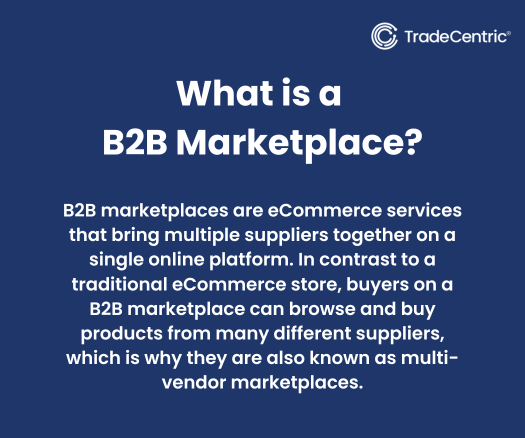Table of Contents
Business-to-business marketplaces are eCommerce services that bring multiple suppliers together on a single online platform. In contrast to a traditional eCommerce store, buyers on a B2B marketplace can browse and buy products from many different suppliers, which is why they are also known as multi-vendor marketplaces.
The modern B2B marketplace is different from a B2C, or business-to-consumer, setup where businesses sell products to individuals vs. other businesses. Many B2B suppliers may already sell via large public B2B marketplaces like Amazon Business, Alibaba, or an online food services marketplace. But these online marketplace giants, especially Amazon Business, are the tip of the online marketplace iceberg.
Online B2B Marketplace Overview & Stats

Online B2B marketplaces are attractive to both buyers and suppliers. Buyers gain access to a wide range of pre-vetted suppliers in a convenient location. Suppliers reach a larger customer base than they could individually. Digital Commerce 360 estimates that B2B marketplace sales could reach $3.6 trillion by 2024, an increase of just under $3 trillion from 2018.
An increasing number of B2B suppliers with eCommerce stores choose to launch their own B2B marketplace. According to Gartner, 80% of B2B sales interactions between suppliers and buyers will occur in digital channels by 2025.
In the past, building a B2B marketplace would have been a complex and expensive proposition, but modern marketplace platform software like Mirakl can transform a single-seller B2B eCommerce store into a business-to-business marketplace, empowering suppliers to launch marketplaces based on their existing store.
A key benefit of this approach is services that work with a business’s existing store will also work with their Mirakl-powered B2B eCommerce marketplace, including TradeCentric’s B2B Connected Commerce Integration Platform.
There are several types of B2B marketplaces. Let’s explore some of the key differences, how buyers and suppliers benefit from a B2B marketplace, and how TradeCentric can help bring eCommerce marketplaces and eProcurement platforms together to enable procurement automation features that include PunchOut catalogs, Purchase Order Automation, and Invoice Automation to facilitate business growth.
B2B Marketplace Examples
Some of the most well-known B2B marketplaces include platforms like:
- Wayfair
- Quartzy
- Zageno
- LabViva
- Zoro
- Prendio
These platforms illustrate the range and versatility of B2B marketplaces across industries, from manufacturing and electronics to retail and healthcare. TradeCentric supports integration capabilities for leading B2B marketplace platforms.
Why B2B Marketplaces Continue to Flourish in 2025?
As a consumer, buying products online is as simple as a Google search followed by cursory price comparisons and a glance at the reviews. For a B2B buyer, the process is more complex and, consequently, more expensive – especially if raw materials are involved.
Suppliers have to be identified and vetted. Contract negotiations may take months and involve many different stakeholders. Once the relationship is established, it must be monitored and managed for compliance, which requires manual and automated audits related to products and pricing.
B2B sales are just as complicated from a marketplace operator perspective. They must find buyers, negotiate, implement processes and policies agreeable to both sides of the transaction, as well as manage contracts, invoicing, and inventory.
B2B eCommerce marketplaces streamline business-to-business procurement and sales by acting as a digital intermediary between buyers and suppliers. This helps reduce marketing costs, which is an especially big perk for small businesses and business to business marketplaces that need to watch their budgets. With maintaining an online platform, a delivery service partner, and other necessary expenses, suppliers of all sizes need their B2B marketplace processes to be as easy, fast, and efficient as possible.
A multi-vendor eCommerce B2B marketplace platform allows buyers to find new products and suppliers more easily, often pre-vetted according to the marketplace’s standards. Marketplaces typically provide data that helps buyers make a decision, and they streamline procurement with digital processes for RFPs and RFIs, contract negotiation, purchasing, and invoicing.
In short, B2B multi-vendor marketplace platforms reduce the cost and complexity of procurement while encouraging buyers to spend more time on the marketplace operator’s site.
Public vs. Private B2B Marketplaces
Public Marketplaces
Public B2B marketplaces, which may also be called independent or open marketplaces, are marketplaces in the traditional sense, such as Amazon, Alibaba, Walmart, and Best Buy. Any seller that fulfills specific criteria can join and sell their products, and any buyer who is interested in those products can make a purchase.
Private Marketplaces
A private marketplace, in contrast, is created primarily to serve the needs of one business. A company like Alibaba may operate private marketplaces with a one-to-many configuration, bringing its suppliers together on a platform it controls to increase procurement efficiency throughout its locations and business units.
Businesses create private eCommerce marketplaces in many different scenarios. For example, a company might outsource manufacturing to several organizations while buying parts from others. It could create a private marketplace that connects its manufacturers to its suppliers to enhance procurement efficiency and accelerate sales. Larger suppliers or groups of suppliers may combine to create a private marketplace for select buyers.
Software and services providers like Mirakl exist to help businesses launch and manage marketplaces of both types while extending and embracing their chosen eCommerce technology, such as Adobe Commerce, SAP Commerce Cloud, and Salesforce Commerce Cloud.
Vertical vs. Horizontal B2B Marketplaces
We have already mentioned examples of a horizontal marketplace: Alibaba and Amazon Business. A horizontal marketplace sells many different product categories across multiple industries. They typically operate on a many-to-many principle: many buyers can connect with many suppliers.
Vertical marketplaces, in contrast, are tightly focused on the needs of a specific sector within an industry. 1-800Flowers.com owns and operates a marketplace, also leveraging Mirakl on Adobe Commerce, within the floral, gift, and gourmet foods verticals. It connects thousands of florists and 3P suppliers with B2B and B2C buyers and takes a percentage of the transaction without the need to warehouse products.
Vertical marketplaces often play a key role in sourcing products for retail. For example, in the fashion industry, Joor and NuOrder connect fashion brands with retailers, helping them to source and buy products. To show you just how prevalent vertical marketplaces are in some industries, Joor works with 200,000 retailers and 8,600 brands across the world.
The Benefits of B2B eCommerce Marketplaces
Traditionally, B2B sales are conducted through one-on-one relationships between buyers and suppliers. B2B eCommerce marketplaces offer flexible alternatives for building buyer relationships and can provide additional advantages, including:
- Enhanced shopping experience and ability to attract customers.
- Improved information flow, which enhances planning and coordination.
- Simplified and accelerated ordering with powerful online product comparison tools.
- Reduced staffing costs for research, procurement, and sales relationship management.
- Increased pricing transparency leading to more efficient markets.
- The ability to test product lines’ selling effectiveness.
- New business opportunities through the network effects of well-organized marketplaces.
- Suppliers are empowered to “sell more” by offering 3rd party products through their commerce solution, driving revenue opportunities while providing more value to their customers.
TradeCentric Connects Buyer eProcurement Platforms to B2B Marketplaces
eProcurement is rapidly becoming the fastest-growing B2B sales channel, with a recent report indicating that the global eProcurement market is expected to grow at a CAGR of 10.2% from 2021 to 2028. Buyers are increasingly looking to integrate suppliers into their eProcurement spend management, internal private marketplaces, and ERP platforms. This trend extends to B2B marketplaces, emphasizing the importance of seamless integration for enhanced efficiency and streamlined procurement processes.
However, integrating buyer eProcurement platforms with a B2B marketplace is not straightforward. Buyers use many different eProcurement solutions, each with unique integration requirements. That makes it challenging to offer integration and automation features such as PunchOut catalogs, Purchase Order Automation, and Invoice Automation. The TradeCentric Platform provides the technology and support marketplace operators need to overcome B2B integration challenges and connect with their buyers.
The TradeCentric Platform provides the technology and support marketplace operators need to overcome B2B integration challenges and connect with their buyers.
The TradeCentric Platform Helps:
- B2B buyers integrate B2B marketplace platforms with their eProcurement or ERP platforms.
- B2B marketplaces offer features such as PunchOut catalogs and Purchase Order Automation to buyers.
- B2B suppliers offer more diverse purchasing methods to their buyers who have invested in eProcurement platforms.
Contact us to learn how TradeCentric empowers businesses to connect with thousands of trading partners on B2B marketplaces.




